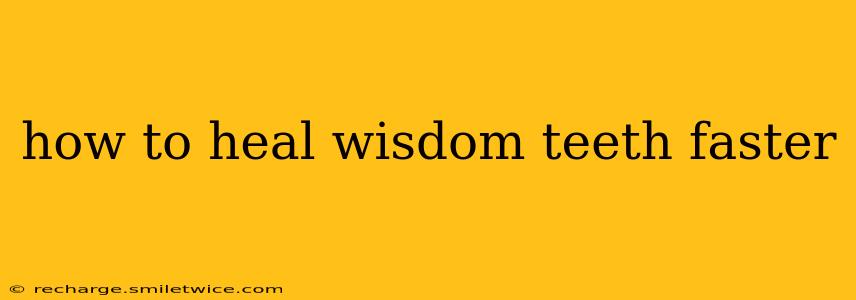Extracting wisdom teeth is a common procedure, but the recovery process can be uncomfortable. While complete healing takes time, there are several things you can do to promote faster and more comfortable healing. This guide provides evidence-based strategies and answers frequently asked questions to help you navigate your recovery journey effectively.
What are the Stages of Wisdom Teeth Healing?
Understanding the stages of healing is crucial. Typically, healing involves several phases:
- Initial Healing (Days 1-7): This period is characterized by swelling, pain, and bleeding. Proper care during this phase significantly impacts subsequent recovery.
- Intermediate Healing (Days 7-21): Swelling subsides, pain reduces, and the extraction site begins to close.
- Advanced Healing (Weeks 3-6): Bone growth fills the socket, and the gum tissue fully heals.
While complete bone regeneration may take several months, significant improvement is seen within the first few weeks.
How Long Does It Take for Wisdom Teeth to Heal Completely?
Complete healing from wisdom teeth extraction typically takes 6-8 weeks, although this can vary depending on individual factors like age, overall health, and the complexity of the extraction. Full bone regeneration can take even longer.
What are Some Effective Home Remedies to Heal Wisdom Teeth Faster?
Several home remedies can support faster healing. Remember these are complementary to medical advice, not replacements.
- Ice Packs: Applying ice packs to the affected area for 15-20 minutes at a time, several times a day, helps reduce swelling and pain.
- Saltwater Rinse: Gently rinsing your mouth with warm saltwater several times a day helps keep the area clean and promotes healing.
- Over-the-Counter Pain Relievers: Ibuprofen or acetaminophen can manage pain and inflammation. Always follow the recommended dosage.
- Soft Foods: Stick to soft foods like yogurt, applesauce, and mashed potatoes for the first few days to avoid irritating the extraction site.
What Foods Should I Avoid After Wisdom Teeth Removal?
Avoid foods that can dislodge blood clots or irritate the healing area:
- Spicy foods
- Hot foods
- Acidic foods
- Hard, crunchy foods
- Straws: Avoid straws as they can create suction and dislodge blood clots.
How Can I Prevent Dry Socket After Wisdom Teeth Removal?
Dry socket (alveolar osteitis) is a painful complication where the blood clot at the extraction site is dislodged. To prevent this:
- Follow post-operative instructions carefully.
- Avoid smoking.
- Avoid excessive spitting or rinsing.
- Don't touch the extraction site.
What Are the Signs of Infection After Wisdom Teeth Removal?
Seek immediate medical attention if you experience:
- Severe, persistent pain.
- Excessive swelling or bleeding.
- High fever.
- Pus or foul-smelling drainage from the extraction site.
- Redness or warmth around the extraction site.
When Should I See a Dentist After Wisdom Teeth Removal?
You should follow your dentist's instructions regarding post-operative checkups. Usually, a follow-up appointment is scheduled to assess healing progress. Don't hesitate to contact your dentist if you have any concerns.
How Can I Reduce Swelling After Wisdom Teeth Removal?
In addition to ice packs, elevating your head while sleeping can also help minimize swelling. Maintaining proper hydration also supports healing.
What is the Best Way to Clean My Mouth After Wisdom Teeth Extraction?
Gentle saltwater rinses are recommended. Avoid aggressive brushing or flossing near the extraction site until instructed otherwise by your dentist.
This comprehensive guide provides valuable insights into the healing process after wisdom teeth extraction. Remember, following your dentist's instructions is crucial for optimal healing. If you have any concerns, always consult your dentist or oral surgeon. This information is for general knowledge and should not be considered medical advice. Always consult with a healthcare professional for personalized guidance.
